After show of might, is China now ready to invade Taiwan by 2027?
As China expands its military, more Taiwanese than ever before want a bigger defence budget, while Japan is rearming at a clip not seen in 80 years. The programme, When Titans Clash, susses out the different Asian perspectives on peace.
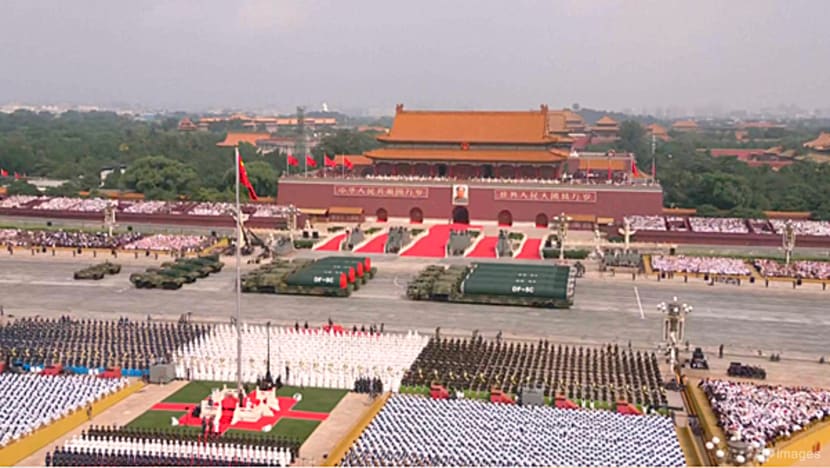
China debuts its DF-5C intercontinental strategic nuclear missile at the Sep 3 Victory Day parade.

This audio is generated by an AI tool.
BEIJING/TOKYO/TAIPEI: Hundreds of aircraft and ground equipment, some never been displayed before in public, rolled forward in a show of power when China marked Victory Day and the 80th anniversary of the end of World War II.
The grand finale to the military parade on Sep 3 was the new DF-5C intercontinental strategic nuclear missile. China’s media report that the missile has “the entire globe under its strike range”.
This whole parade of weaponry was confirmation of what some analysts have long been discussing.
“China’s military modernisation is quite unprecedented. It’s certainly the fastest, most ambitious modernisation in peacetime that we’ve seen in modern history,” said David Sacks, a fellow for Asia studies in the United States-based Council on Foreign Relations.
“What’s worrying is not just the sheer scale, … it’s also the advanced capabilities.
“If you look at hypersonic missiles (and) … China’s most modern fighter jets, a lot of these are (on a par with) the United States. … In some areas, they’re even ahead.”
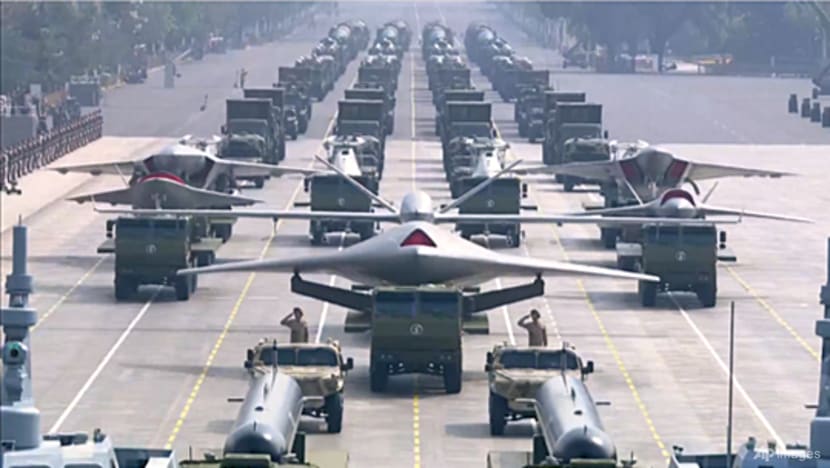
China’s neighbours are watching closely. “Why do you need so many weapons, missiles and hundreds of nuclear (warheads)?” questioned Ken Jimbo, a professor of international relations at Keio University and managing director of programmes at the International House of Japan.
The most pressing question — taken up in the programme When Titans Clash — is whether this build-up is intended for an invasion of Taiwan.
TAIWAN PREPARES
It was in Singapore, at the Shangri-La Dialogue on May 31, where US Secretary of Defense Pete Hegseth warned that an attempt to seize Taiwan by force “could be imminent”: by 2027. Beijing has rejected such claims.
But do the Taiwanese themselves believe 2027 is a deadline? Christina Chen, an assistant research fellow at Taiwan’s Institute for National Defense and Security Research, offered a cautious view.
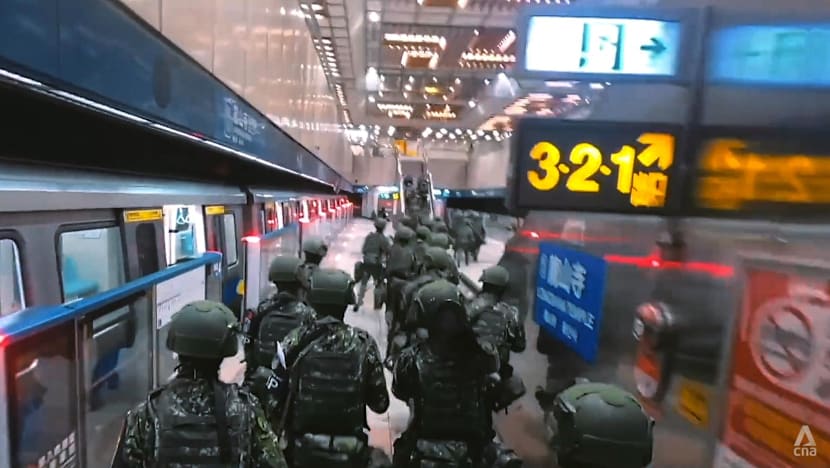
“(Chinese President) Xi Jinping isn’t ready to launch a major conflict like an invasion of Taiwan. Internally, China is facing many challenges: economic slowdown, social protests, political pressures,” she said.
“It’s probably not the right time for them to reunify Taiwan through force. Instead, their strategy now focuses on influencing Taiwan through other means.”
Many Taiwanese experts have long claimed that China is engaged in cyberattacks and disinformation campaigns, for example.
Like Chen, 65 per cent of Taiwanese believe an invasion is unlikely in the next five years, according to an Institute for National Defence and Security Research survey released in April.
Yet, a majority want to be ready: 51 per cent want a bigger defence budget — the highest level of support in the poll’s history.
WATCH: 80 Years After WWII — China, Japan and Taiwan expand their militaries for peace? (47:06)
Indeed, Taiwanese President William Lai has prioritised readiness. In March, he oversaw the first civil defence drills under the Whole-of-Society Defence Resilience Committee that his administration created last year.
Days later, the Chinese People’s Liberation Army (PLA) encircled Taiwan in a massive exercise to practise a blockade.
According to the PLA, the exercise goals included “controlling energy lanes, cutting off supply routes and blocking escape paths”, with strikes on simulated targets such as ports and energy facilities.
Chen said: “It was the first time that the PLA was showing … simulated precision strikes on Taiwan’s infrastructure.”
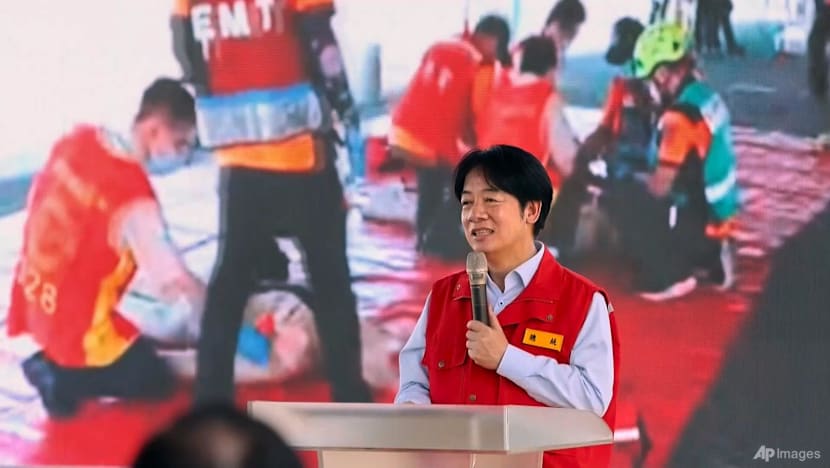
In July, Taiwan’s annual Han Kuang Exercise mobilised 22,000 reservists — the largest number in its 41-year history — as both soldiers and civilians rehearsed for invasion scenarios.
Having earlier labelled China a “foreign hostile force”, Lai wrote on Facebook, on the same day as Beijing’s military parade, that “Taiwan does not believe in commemorating peace by holding guns”.
JAPAN’S GROWING ALARM
Concerns about a potential crisis are not confined to Taiwan. Japan’s defence White Paper published in July stated that China posed “an unprecedented and the greatest strategic challenge” to Japan’s security.
Back in 2022, Japan pledged 43 trillion yen (US$290 billion) to a five-year military build-up, its largest build-up since World War II.
Taiwan was, and remains, top of mind for Japan. As the late Prime Minister Shinzo Abe once mentioned, a Taiwan contingency is a Japan contingency.
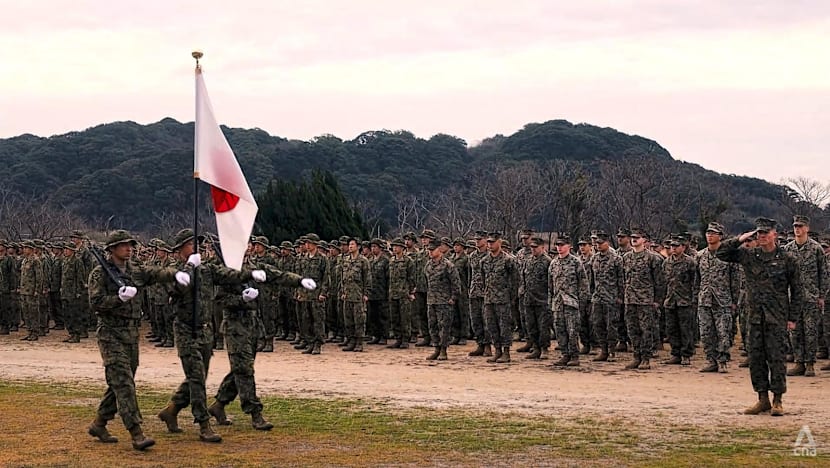
Geography explains much of this reasoning. After the then US House of Representatives Speaker, Nancy Pelosi, visited Taipei in 2022, China fired missiles at the waters around Taiwan, near Yonaguni Island. One landed just 80km off the Japanese island’s coast.
While military installations have since been popping up on Yonaguni, the question is, would Japan defend Taiwan militarily?
“There are no treaty obligations for Japan to protect Taiwan,” highlighted Akira Igata, a project lecturer at the University of Tokyo’s Research Centre for Advanced Science and Technology. “What’s important for Japan, though, is that the Taiwan contingency doesn’t happen.
“So it’s less about Japan trying to defend Taiwan but more about Japan doing everything it can with its allies and partners to make sure that such a crisis is deterred.”
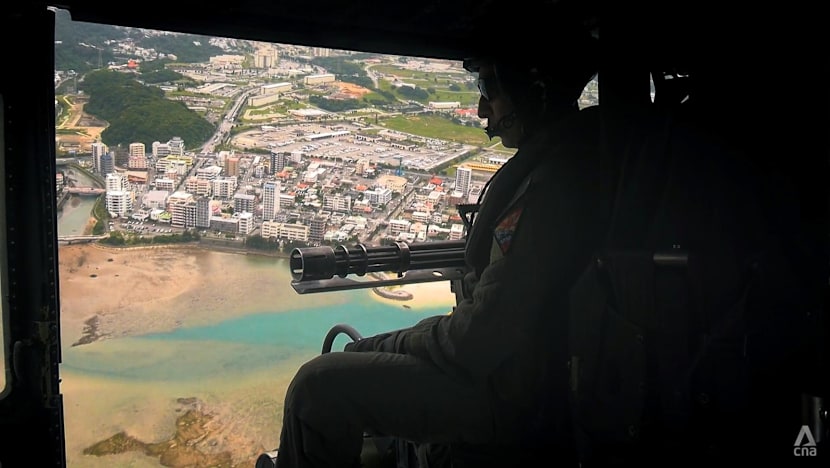
Retired PLA Senior Colonel Zhou Bo, now a senior fellow at Tsinghua University’s Centre for International Security and Strategy, thinks Japanese public opinion makes military intervention unlikely.
“The likelihood of conflict between China and Japan, I believe, is (high) when Japan starts to provide logistics support to the United States, because that’s a kind of treaty obligation for them,” he said.
“But they aren’t stupid because … not many people would support a direct conflict with China.
“I don’t believe the Japanese would assist the United States military unless it’s attacked by China first, for example with missiles. But why would China, all of a sudden, decide to launch a missile attack on Japanese territory?”
Yet, risks remain. Analysts point to the missiles China fired in 2022 as well as the 25,000 to 29,000 US troops stationed in Okinawa.
Any US military action to protect Taiwan will very likely involve Okinawan bases — making Japan a potential target. This possibility divides Okinawans, with protests against the US bases staged on a regular basis.
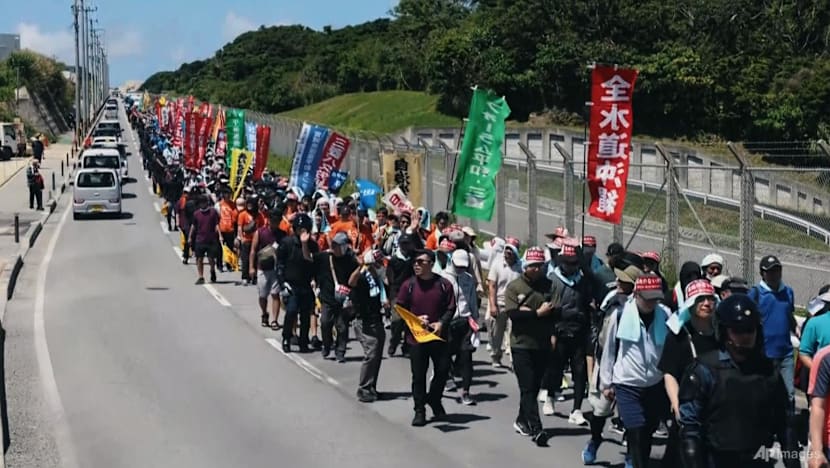
“There are those in Okinawa who truly believe that any type of preparation for a crisis, any type of military build-up to deter such activities from occurring, is escalatory in nature,” said Igata.
“For them, the best option is to not do anything because any action would be seen (as) provocative by the other side.
There are others in Okinawa who believe that no, deterrence works. We need to pursue peace through strength. We need to be prepared.”
WHERE’S THE PATH TO PEACE?
As Japan, Taiwan and China all increase their military spending, it is China’s growing nuclear arsenal that is especially attention-grabbing.
According to the Stockholm International Peace Research Institute, the world’s fastest-growing nuclear programme is China’s. Since 2023, its arsenal has expanded by 100 nukes per year, reaching 600 this year, which is the world’s third-largest stockpile.
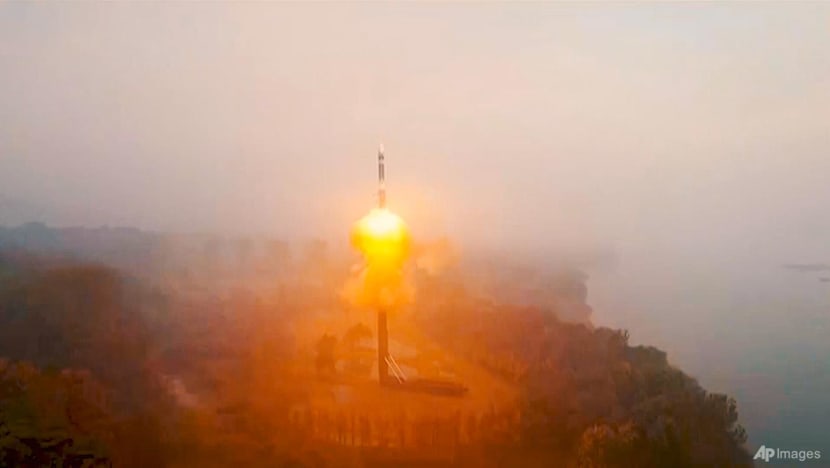
Zhou argued that expansion was necessary. “The United States has never talked about using nuclear weapons against Russia first,” he said.
“So why would … some people and some organisation like the Atlantic Council talk about using nuclear weapons against China? That’s because they believe China’s nuclear arsenal is small.
The Chinese should increase it to the extent that the United States would never, ever dare to think about using nuclear weapons against the Chinese.”
For Japan, the dominant narrative now is that deterrence is the best way to ensure peace — hence the increase in its defence budget from 5.4 trillion yen in 2022 to its target of 8.9 trillion yen in 2027.
“We’re looking at potentially a high-end operation over Taiwan,” said Jimbo. “That requires us to engage side by side with the United States and to upgrade our integrated interoperability with US forces. And this is where we are now.”
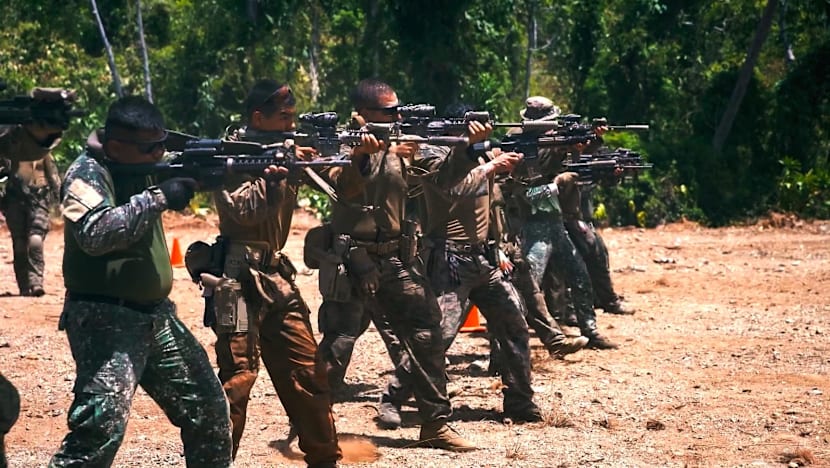
Taiwan, meanwhile, continues to pursue a “porcupine strategy”: making an invasion costly through weapons purchases from the US and an expanded civil defence.
But Zhou dismissed these efforts. “(US President Donald) Trump is a businessman. Selling arms to Taiwan would make a lot of money,” he said.
“(But) no matter how many weapons (the US) wants to sell to Taiwan, they’re just useless because the (growing) strength of mainland China is simply overwhelming.”
For him, the key point is to keep the door open to reunification. “If Beijing believes peaceful reunification is still possible, Beijing would have patience,” he said. But if Taiwan’s leaders behave “recklessly”, he warned, “that’s the most dangerous moment”.
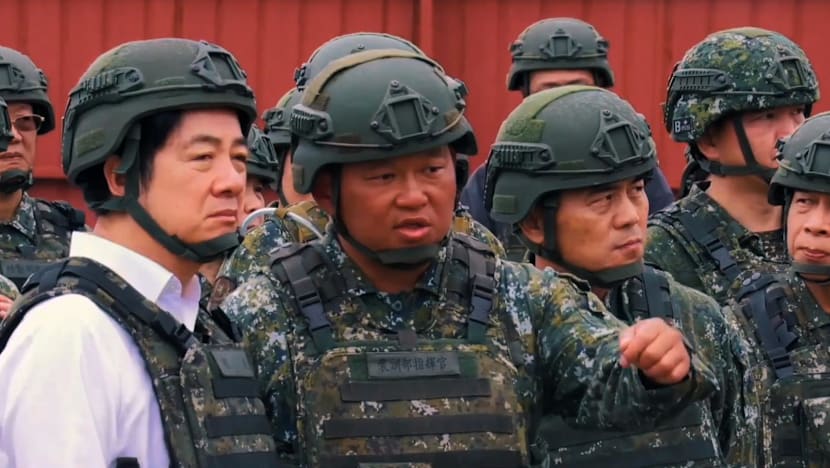
“According to our anti-secession law, the last condition is that if the Chinese government believes that all the possibilities for peaceful reunification are gone, … we have to use force,” Zhou said.
At this week’s Victory Day parade, Xi said that “humanity again has to choose between peace and war” — while iterating that the Chinese people “remain committed to the path of peaceful development”.
Watch this episode of When Titans Clash here.


















